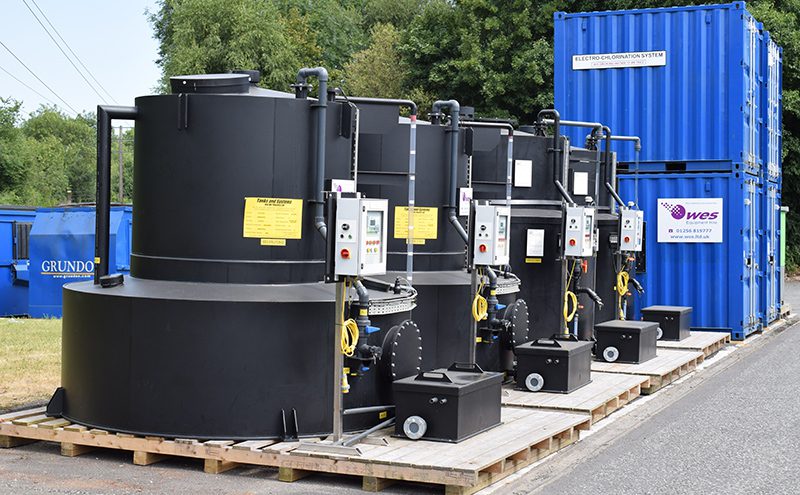
Before investing further in their own chemical dosing equipment, water companies should consider the operational and financial benefits of hiring instead. Kevin Wheeler, Managing Director of dosing technology specialist WES Group, explains why.
Treating water and wastewater is a complex and potentially costly process involving many steps, each of which must comply with strict regulations. Chemical dosing is one of its most critical elements. To maintain quality of production output, manage costs and ensure compliance with environmental and safety standards, its application must be precise, consistent and controlled.
Dosing equipment must meet process needs effectively and dependably, day after day, but there are many situations in which water companies and contractors find this very challenging. A variety of both OPEX (operating expenditure) and CAPEX (capital expenditure) arguments can be made in favour of hiring a dosing system to address these challenges. Depending on circumstances, hire may be a short-term problem-solver or a long-term solution.
Emergencies
If your equipment suffers an unplanned stoppage, a breakdown or leak, a hired system can be deployed to keep your plant in operation. This reduces the risk of untreated discharges and avoids the expense of pollution-related fines. It buys your engineers time to identify the problem, obtain replacement parts and make repairs.
Planned shutdowns
A dosing system may need to be shut down for maintenance, refurbishment, modification, upgrading or expansion of your water and wastewater treatment facilities. Hiring will again avoid interrupting your process and will keep your plant operating profitably.
Testing and evaluation
With ever-increasing regulatory and cost pressures, it makes sense to explore new treatment strategies with potential for improving efficiency. But what works well in the laboratory may not be so effective in your operation. Before buying any new equipment, hire a dosing system for tests and field trials. That way, you can be sure your investment will not be a waste of money.
Fluctuating demands
If your operation is subject to short-term changes in demand or treatment requirements, you need to increase your process flexibility. Hiring allows rapid and cost-effective adaptation of your site’s capabilities.
Skilled staff shortages
Faced with today’s world of de-manning and loss of skills, water companies may find themselves lacking in the necessary capacity and knowledge to install, test and maintain dosing equipment. Hired equipment has the advantage of being specified, engineered and tested by a specialist provider, for supply as a ready-to-install standalone system. A supplier can also manage the installation, commissioning and maintenance. The risk of costly problems arising from overstretching your staff resources can be averted.
Budget constraints
When the time comes for substantially upgrading your treatment system, or building a new one, constraints on capital expenditure may be a major obstacle. Hiring eases the pressure on CAPEX by reducing the cost of dosing equipment to a relatively low monthly payment under your OPEX budget.
Optimising the hire option
To be sure of gaining full benefit from hiring, you should ask providers the following questions before going ahead:
• What experience do you have of the water and wastewater sector? Can you show us a comprehensive portfolio of equipment and services meeting its special needs? Look for a range of appropriate resources and capabilities, with a strong infrastructure. Assure yourself that the provider can bring them together into a package that meets your budget and operational needs.
• Do your systems cater to all scales of operation? Can you provide everything from compact to high-capacity solutions? Will the operation and filling methods integrate seamlessly with our procedures and supply chain? Site and process- specific chemical and storage requirements can vary by several orders of magnitude. At one end of the scale there are very compact integrated systems which can be carried to the site. At the other extreme there are containerised systems with tank capacities of 20 cubic metres, filled by drum, IBC (intermediate bulk container) or tanker.
• Will your equipment be readily adaptable to our operation? For instance, are the pumps, valves and pipework suited to the chemicals we use? Will the pumps meet our flow and pressure specifications? Can the timing and dosing parameters be easily set and adjusted? Versatility is essential, and this must be engineered into systems right from the start.
• How quickly will the equipment be available to us? How big is your fleet? How efficient are your logistics? What is your emergency response time? If you need to hire a system at short notice, and even more so in an emergency, you must be confident in this respect. Your provider should have both the capability and the sense of urgency to deliver quickly. Satisfy yourself that when you call, the hire partner, they will be able to mobilise equipment the same day and have it working on your site in a matter of hours or days, not weeks.
• Are your systems quick and easy to deploy? Are they palletised or containerised for fast transport? Are they sufficiently robust and weatherproof to be placed wherever we need them? Are their components pre-integrated and pre-tested? In the case of an ISO tank, for instance, will it come with a suitable bund, and will its filling and safety systems already be in place? Check that the provider sees these considerations as priorities and is equipped accordingly.
• Will your equipment connect readily with ours? Will you send all the right pipework and connectors to link easily with existing or supplied dosing lines? Do your controls operate independently, or will they need to be linked to existing sensors as well as remote or on-site control systems? There is nothing worse than finding that the hired system’s connections are incompatible with yours. The provider should ensure this never happens.
• Can we rely on your advice? Do your staff have the necessary expertise to identify the best system for our needs? Are they qualified to give expert technical guidance on its installation and maintenance? Unless you already know exactly what system you want, and how to install and maintain it, you will need to have total trust in the provider’s advice and support. The services available should include building equipment packages to meet your technical specifications, and making recommendations based on a site survey.
• Is your service flexible and responsive? Can you assure us that you will always be able to meet our lead times and cover the necessary hire periods? Look for a proven track record and reputation for fulfilling customers’ expectations in both planned and emergency situations.







